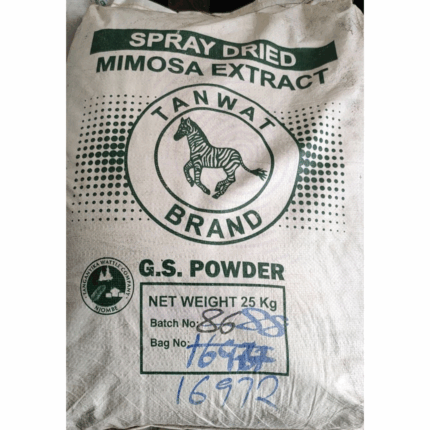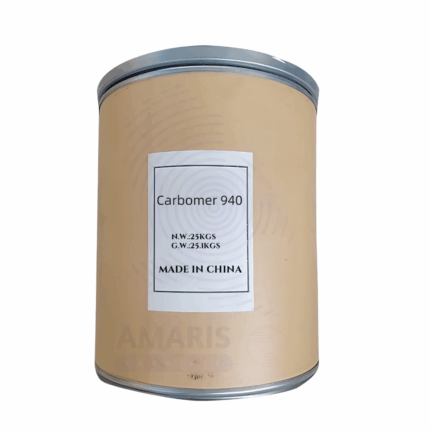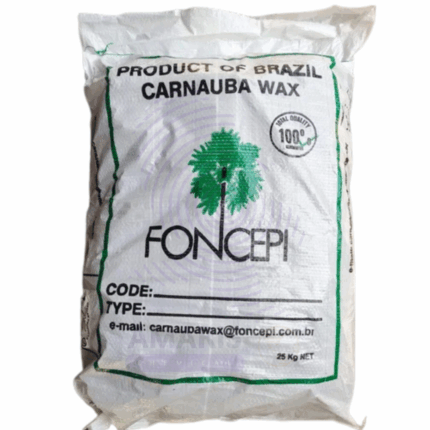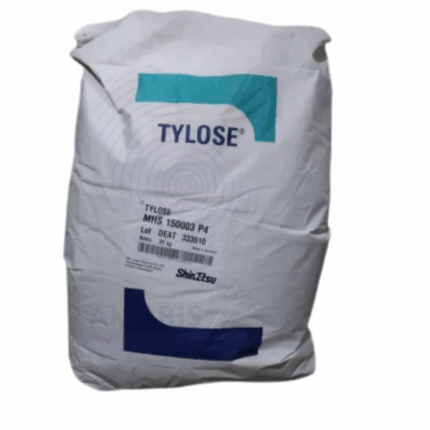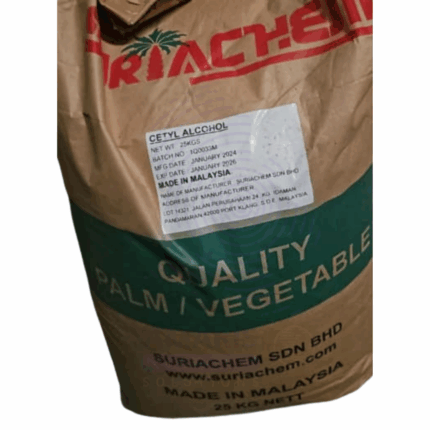“Carnauba Wax Prime Yellow” has been added to your cart. View cart
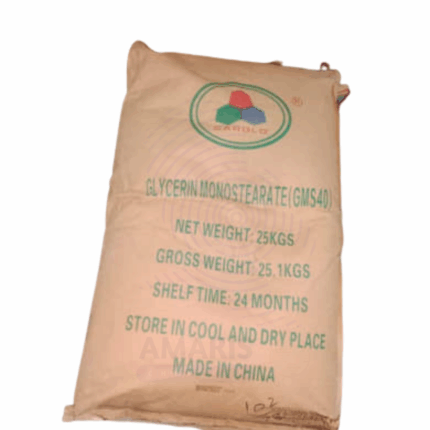
Glycerol Monostearate Powder
$ 3.00 Original price was: $ 3.00.$ 2.67Current price is: $ 2.67.
Glycerol Monostearate Flakes
Whatsapp Order
Glycerol Monostearate Flakes is a white to off-white waxy flake form emulsifier composed of 40% monoglycerides of fatty acids, primarily stearic and palmitic acids, combined with other glycerides and esters. Derived mainly from vegetable oils, this food-grade emulsifier is widely utilized in food, cosmetic, pharmaceutical, and industrial sectors for its multifunctional properties. GMS 40% flakes serve as effective emulsifiers, stabilizers, anti-caking agents, and texture enhancers, with excellent compatibility and versatility in formulations requiring semi-solid or solid fats.
Categories: Emollients, Emulsifiers, Excipients
Tags: Cosmetic ingredient, Emulsifier, Food additive, Glycerol Monostearate, GMS Flakes, Pharmaceutical excipient, Stabilizer
Description
Table of Contents
Toggle
Glycerol Monostearate Flakes
Primary Uses
- Food Industry
- Emulsifying agent in margarine, spreads, and shortenings to blend fats and water, improving texture and consistency.
- Acts as an anti-caking and anti-staling agent in baked goods, improving softness and extending shelf life.
- Used in ice cream and dairy products to enhance creaminess, smoothness, and melt properties.
- Functions as a stabilizer in confectionery for uniformity and improved mouthfeel.
- Utilized in chocolate and coatings to improve gloss and texture by controlling fat crystallization.
- Serves as a release agent in baking and candy manufacturing, preventing product sticking.
- Added to instant mixes and beverages to stabilize oil-water emulsions and maintain shelf stability.
- Pharmaceuticals & Nutraceuticals
- Employed as an excipient in topical creams, ointments, and gels for enhanced emulsification and texture.
- Functions as a tablet binder and dispersing agent in solid dosage forms.
- Used in nutritional supplements to aid in the uniform distribution of fat-soluble vitamins and oils.
- Cosmetics & Personal Care
- Emulsifier and thickener in creams, lotions, body butters, and hair conditioners.
- Improves skin feel and spreadability, providing a smooth and non-greasy texture.
- Acts as a stabilizer and opacifier in shampoos, liquid soaps, and sunscreen formulations.
- Enhances the water resistance and longevity of makeup and sunscreen products.
- Industrial Applications
- Used as an antistatic and lubricating agent in plastics, rubber, and packaging films.
- Functions as a processing aid and internal lubricant in polymer extrusion.
- Serves as a softening agent in textile processing and finishing.
Secondary Uses
- Agriculture
- Functions as an emulsifier in pesticide formulations to improve dispersion and efficacy.
- Used in animal feed supplements for improved mixing and stability.
- Personal Hygiene Products
- Added in deodorants, shaving creams, and cleansing bars for enhanced texture and stability.
- Paints & Coatings
- Used as a dispersing and emulsifying agent to improve consistency and finish.
PRODUCT KEY FEATURES
- Basic Identification Attributes
- Chemical Name (IUPAC): 1-Monostearoyl-rac-glycerol
- Common/Trade Name: Glycerol Monostearate (GMS)
- CAS Number: 31566-31-1 (commercial blends)
- HS Code: 2915.90.70
- Molecular Formula: C21H42O4 (pure monostearate)
- Molecular Weight: ~358.56 g/mol
- Synonyms:
- Glyceryl monostearate
- GMS 40
- Monostearin
- E471 (food additive)
- Octadecanoic acid monoglyceride
- Physical & Chemical Properties
- Physical State: Waxy flakes
- Color & Odor: White to off-white; faint fatty odor
- Purity: Approx. 40% monoglycerides content
- Melting Point: 55–65 °C
- Solubility:
- Insoluble in water
- Soluble in hot ethanol, oils, and fats
- pH (1% dispersion): 6–8
- HLB Value: 3.8–5.6 (oil-in-water emulsifier)
- Safety & Hazard Attributes
- GHS Classification: Not hazardous
- NFPA Ratings: Health 0, Flammability 1, Reactivity 0
- Toxicity: Non-toxic and Generally Recognized As Safe (GRAS)
- Irritation: Mild skin or eye irritant at high concentrations
- Storage & Handling Attributes
- Container Type: Multi-wall paper bags with polyethylene liner or fiber drums
- Storage Conditions: Store in a cool, dry, ventilated area, away from moisture and heat
- Shelf Life: Up to 24 months under recommended conditions
- Handling Notes: Avoid dust formation; keep container tightly closed
- Regulatory & Compliance Attributes
- Food Grade: Complies with FDA GRAS, EU E471, JECFA standards
- Pharmaceutical Grade: USP/NF grades available
- REACH Registered: Yes
- Halal and Kosher: Certificates available depending on supplier
- Environmental & Health Impact
- Biodegradability: Easily biodegradable
- Ecotoxicity: Low environmental toxicity
- Bioaccumulation: Not expected
- Carcinogenicity/Mutagenicity: No evidence of carcinogenic or mutagenic effects
SAFETY HANDLING PRECAUTIONS
- Safety Handling Precautions
- PPE Required: Gloves, dust mask, safety goggles
- Handling Guidelines: Avoid inhalation of dust, avoid skin and eye contact
- Hygiene: Wash hands after handling; avoid eating or drinking during handling
- First Aid Measures
- Inhalation: Move to fresh air; consult a physician if symptoms persist
- Skin Contact: Wash with soap and water
- Eye Contact: Rinse thoroughly with water for 15 minutes; seek medical advice if irritation persists
- Ingestion: Rinse mouth; seek medical attention if large quantities ingested
- Firefighting Measures
- Fire Hazards: Combustible solid at high temperature
- Extinguishing Media: Water spray, foam, dry chemical, CO₂
- Combustion Products: Carbon oxides and fatty acid fumes
- Firefighter PPE: Use self-contained breathing apparatus and protective clothing
Related products
Carbomer
Carbomer is a high molecular weight, crosslinked polyacrylic acid polymer used primarily as a rheology modifier, thickening agent, and suspension stabilizer. Supplied as a fluffy white powder, it exhibits high viscosity and excellent clarity when neutralized and dispersed in water or alcohol-water systems. Carbomer 940 is widely valued for its ability to form clear gels, control flow properties, and stabilize emulsions. It is commonly used in cosmetics, personal care, pharmaceuticals, and household formulations due to its consistency, compatibility, and efficient thickening performance at low concentrations.
Carnauba Wax
Carnauba Wax is a natural vegetable wax obtained from the leaves of the Copernicia prunifera palm tree, native to northeastern Brazil. It appears as a hard, brittle, yellow to brownish-yellow wax with a faint, characteristic odor. Known as the “queen of waxes,” Carnauba Wax is prized for its exceptionally high melting point, glossy finish, and excellent hardness. It is a premium wax widely used in cosmetics, food, pharmaceuticals, automotive, and industrial applications as a natural, biodegradable alternative to synthetic waxes. Its film-forming, emulsifying, and protective properties make it highly versatile for use in coatings, polishes, and skincare products.
Cellozize Tylose
Cellozize Tylose, commonly known by the trade name Tylose, is a brand of hydroxyethyl cellulose (HEC), a non-ionic, water-soluble cellulose ether derived from natural cellulose. It appears as a white to off-white powder with excellent thickening, binding, and film-forming properties. Tylose is widely used as a rheology modifier, stabilizer, and thickener in various industries including construction, pharmaceuticals, cosmetics, and food. It provides viscosity control, improves texture, and enhances water retention in formulations. Due to its inert, non-toxic, and biodegradable nature, Tylose is favored as a versatile polymer in many applications.
Cetyl Alcohol
Cetyl Alcohol, also known as 1-Hexadecanol or Palmityl Alcohol, is a fatty alcohol derived primarily from natural sources such as palm oil and coconut oil. It appears as a waxy, white to pale yellow solid with a faint fatty odor. Cetyl Alcohol is widely used in cosmetic, pharmaceutical, and industrial formulations due to its emollient, emulsifying, thickening, and stabilizing properties. It helps improve texture, consistency, and moisturizing effects in personal care products. Cetyl Alcohol is compatible with many ingredients, making it a versatile multifunctional ingredient.
Fish Collagen
Fish Collagen is a natural protein derived from the skin, scales, and bones of various fish species through enzymatic hydrolysis or acid extraction. It is predominantly Type I collagen, known for its excellent bioavailability and biocompatibility. Fish Collagen typically appears as a fine white to off-white powder with low odor and high solubility in water and acidic solutions. It is widely prized in cosmetics, nutraceuticals, pharmaceuticals, and food industries due to its superior absorption compared to mammalian collagen, making it highly effective in skin, joint, and bone health applications. Fish Collagen supports the body’s extracellular matrix, promoting skin elasticity, hydration, and tissue repair.
Glycerol Monostearate Powder
Glycerol Monostearate Powder is a white to off-white, free-flowing powder composed of 50% monoglycerides of stearic and palmitic acids, typically derived from vegetable oils. It is a non-ionic emulsifier widely used in food, cosmetics, pharmaceuticals, plastics, and industrial applications. GMS functions as an emulsifying agent, stabilizer, thickener, anti-staling agent, and opacifier. In food, it improves texture and extends shelf life. In cosmetics and pharmaceuticals, it enhances creaminess and stability. GMS 50% is often blended with other emulsifiers or surfactants and is valued for its versatile functionality, safety, and compatibility with a wide range of ingredients.
Hydroxyethyl Cellulose
Hydroxyethyl Cellulose , marketed under brand names such as Natrosol, is a non-ionic, water-soluble polymer derived from cellulose by reacting alkali cellulose with ethylene oxide. It appears as a white to off-white, free-flowing powder with excellent thickening, binding, and film-forming properties. HEC is widely used as a rheology modifier and stabilizer due to its high water retention, solubility, and compatibility with a broad range of ingredients. It is valued in many industries including cosmetics, pharmaceuticals, paints, adhesives, and personal care products.
Illipe Butter
Illipe Butter is a natural, hard vegetable fat derived from the nuts of the Shorea stenoptera tree, native to the rainforests of Borneo. Known for its high melting point and rich moisturizing profile, Illipe Butter is prized in cosmetic, pharmaceutical, and food applications for its emollient qualities and stability. It closely resembles cocoa butter in composition and function, making it a sustainable alternative in formulations requiring consistency and long shelf life. The butter appears as a pale yellow to off-white solid with a mild, neutral aroma.


 Acidulants
Acidulants Antioxidants
Antioxidants Nutraceutical Ingredients (food)
Nutraceutical Ingredients (food)
 Collectors
Collectors Dust Suppressants
Dust Suppressants Explosives and Blasting Agents
Explosives and Blasting Agents Flocculants and Coagulants
Flocculants and Coagulants Frothers
Frothers Leaching Agents
Leaching Agents pH Modifiers
pH Modifiers Precious Metal Extraction Agents
Precious Metal Extraction Agents
 Antioxidants(plastic)
Antioxidants(plastic) Colorants (Pigments, Dyes)
Colorants (Pigments, Dyes) Fillers and Reinforcements
Fillers and Reinforcements Flame Retardants
Flame Retardants Monomers
Monomers Plasticizers
Plasticizers Polymerization Initiators
Polymerization Initiators Stabilizers (UV, Heat)
Stabilizers (UV, Heat)
 Antifoaming Agents
Antifoaming Agents Chelating Agents
Chelating Agents Coagulants and Flocculants
Coagulants and Flocculants Corrosion Inhibitors
Corrosion Inhibitors Disinfectants and Biocides
Disinfectants and Biocides Oxidizing Agents
Oxidizing Agents pH Adjusters
pH Adjusters Scale Inhibitors( water)
Scale Inhibitors( water)
 Antioxidants(cosmetic)
Antioxidants(cosmetic) Emollients
Emollients Fragrances and Essential Oils
Fragrances and Essential Oils Humectants
Humectants Preservatives
Preservatives Surfactants(cosmetic)
Surfactants(cosmetic) Thickeners
Thickeners UV Filters
UV Filters
 Fertilizers
Fertilizers Soil Conditioners
Soil Conditioners Plant Growth Regulators
Plant Growth Regulators Animal Feed Additives
Animal Feed Additives Biostimulants
Biostimulants Pesticides (Herbicides, Insecticides, Fungicides)
Pesticides (Herbicides, Insecticides, Fungicides)
 Active Pharmaceutical Ingredients (APIs)
Active Pharmaceutical Ingredients (APIs) Excipients
Excipients Solvents(pharmaceutical)
Solvents(pharmaceutical) Antibiotics
Antibiotics Antiseptics and Disinfectants
Antiseptics and Disinfectants Vaccine Adjuvants
Vaccine Adjuvants Nutraceutical Ingredients (pharmaceutical)
Nutraceutical Ingredients (pharmaceutical) Analgesics & Antipyretics
Analgesics & Antipyretics
 Analytical Reagents
Analytical Reagents Chromatography Chemicals
Chromatography Chemicals Spectroscopy Reagents
Spectroscopy Reagents Molecular Biology Reagents
Molecular Biology Reagents Biochemical Reagents
Biochemical Reagents Inorganic and Organic Standards
Inorganic and Organic Standards Laboratory Safety Chemicals
Laboratory Safety Chemicals Specialty Laboratory Chemicals(Special Laboratory Equipment)
Specialty Laboratory Chemicals(Special Laboratory Equipment)
 Demulsifiers
Demulsifiers Hydraulic Fracturing Fluids
Hydraulic Fracturing Fluids Scale Inhibitors(oil)
Scale Inhibitors(oil) Surfactants(oil)
Surfactants(oil) Drilling Fluids
Drilling Fluids
 Dyes and Pigments
Dyes and Pigments Bleaching Agents
Bleaching Agents Softening Agents
Softening Agents Finishing Agents
Finishing Agents Antistatic Agents
Antistatic Agents
 Admixtures
Admixtures Waterproofing Agents
Waterproofing Agents Sealants and Adhesives
Sealants and Adhesives Curing Compounds
Curing Compounds Concrete Repair Chemicals
Concrete Repair Chemicals Anti-Corrosion Coatings
Anti-Corrosion Coatings
 Surfactants(cleaning)
Surfactants(cleaning) Builders
Builders Enzymes
Enzymes Solvents (Cleaning)
Solvents (Cleaning) Fragrances
Fragrances
 Electronic Chemicals
Electronic Chemicals Catalysts
Catalysts Lubricants
Lubricants Photographic Chemicals
Photographic Chemicals Refrigerants
Refrigerants Automotive chemicals
Automotive chemicals Pyrotechnic Chemicals
Pyrotechnic Chemicals
 Biodegradable Surfactants
Biodegradable Surfactants Bio-based Solvents
Bio-based Solvents Renewable Polymers
Renewable Polymers Carbon Capture Chemicals
Carbon Capture Chemicals Wastewater Treatment Chemicals
Wastewater Treatment Chemicals
 Pigments
Pigments Solvents(paint)
Solvents(paint) Specialty Coatings
Specialty Coatings Binders/Resins
Binders/Resins Additives
Additives Driers
Driers Anti-Corrosion Agents
Anti-Corrosion Agents Functional Coatings
Functional Coatings Application-Specific Coatings
Application-Specific Coatings
 Fresh Herbs
Fresh Herbs Ground Spices
Ground Spices Whole Spices
Whole Spices Spice Blends
Spice Blends Dried Herbs
Dried Herbs
 Leavening Agents
Leavening Agents Dough Conditioners
Dough Conditioners Flour Treatments
Flour Treatments Fat Replacers
Fat Replacers Decoratives
Decoratives Preservatives(baking)
Preservatives(baking)
 Plasticizers & Softeners
Plasticizers & Softeners Reinforcing Agents
Reinforcing Agents Adhesion Promoters
Adhesion Promoters Vulcanizing Agents
Vulcanizing Agents Antidegradants
Antidegradants Blowing Agents
Blowing Agents Fillers & Extenders
Fillers & Extenders Accelerators & Retarders
Accelerators & Retarders
